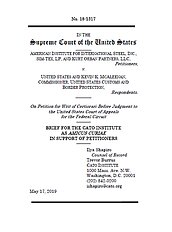Learn more about Cato’s Amicus Briefs Program.
In March of 2018, President Trump imposed a 25 percent tariff on imported steel products. The president imposed the duties under authority to protect “national security” under Section 232 of the Trade Expansion Act, but that’s quite a stretch. In 2017, the United States produced more than twice the amount of steel it imported. As Secretary of Defense Jim Mattis advised during the Section 232 process, military requirements for steel represent only 3 percent of U.S. production. Also, the Trump administration departed from past practice by failing to account for the “reliability” of importing countries, and also by failing to even acknowledge (much less assess) the costs of tariffs. By any measure, President Trump’s steel tariffs are irrational.
The American Institute for International Steel and other parties harmed by the tariffs filed suit in the Court of International Trade alleging that Section 232 is an unconstitutional delegation of lawmaking power to the president. Separation of powers is an essential element of the Constitution and preserving it means that Congress can’t give away its power to the president. Unsurprisingly, the Court of International Trade sided with the government. Although the existence of a non-delegation principle in the Constitution is not controversial, courts are generally unwilling to draw difficult lines between a constitutional delegation and an unconstitutional one. The plaintiffs decided to appeal the case directly to the Supreme Court, which is unusual but warranted in this case. Not only are the steel tariffs causing ongoing harm to the economy, but only the Supreme Court can ultimately decide the issues in this case.
Cato has filed a brief in support of the challengers. We argue that Court of International Trade mistakenly assumed the federal courts may not conduct any oversight of the president’s regulatory powers. To the contrary, if courts can’t review such actions, then Congress violated the non-delegation principle by giving the president powers that are beyond review. And if courts can review the president’s regulatory powers, then President Trump’s steel tariffs fail to survive judicial scrutiny. Although this truncated appeals procedure is available only in extraordinary cases, we also argue that the steel tariffs controversy meets this standard because the normal course would lead to gross judicial waste and also perpetuate a split among the lower courts. Most importantly, the Court should take on this controversy to affirm that the separation of powers remains a crucial bulwark against threats to liberty.

This work is licensed under a Creative Commons Attribution-NonCommercial-ShareAlike 4.0 International License.



